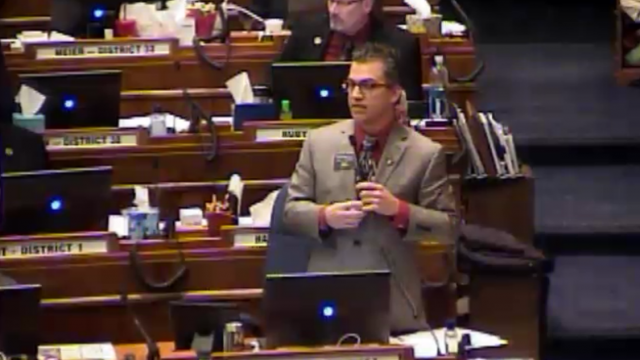ND House Votes Down Bill Requiring That Trains Have At Least Two Crew Members

Rail safety is in the headlines and on the minds of the state’s policymakers, but would state legislation mandating at least two crew members on all trains be good policy?
That’s what was debated on the House floor today. HB1357 would have required that all freight trains have at least two crew members, something punishable by a penalty. After a lengthy debate the bill was voted down on a 46-45 vote.
The debate is worth a watch, because I’m sure a lot of you are having the same reaction I did to the legislation. Why in the world, given the struggles we’re having with rail safety right now, would anyone want freight trains to be crewed by just one person?
But there are a number of reasons why this was flawed legislation.
For one thing, no freight train which operates in North Dakota operates only in North Dakota. Trains are the very definition of interstate commerce, and as such the federal government has primacy over rail regulations. As such, many of the lawmakers felt that this sort of regulation ought to be left to the federal government. House Majority Leader Al Carlson wondered if trains crewed by just one person would have to stop at the North Dakota border to take on an additional crew member.
It seems that a solution to this problem, if it is indeed a problem, should have a more comprehensive application than state-based policy. It really ought to come from the federal government.
Also, there was some question about whether or not the Legislature is even qualified to implement this sort of policy, which was a point Rep. Chris Olson (R-West Fargo) made in his thoughtful comments on the floor. This law would mandate two crew members in all freight train instances, but Olson pointed out that changes in technology may make that mandate superfluous.
Finally there’s the fact that this isn’t happening. The bill’s genesis was in a proposal BNSF put before its union for going to one-man crews, but the union voted it down. Meaning that right now no freight trains are moving through North Dakota with just one crew member, and short of the union changing its stance, that doesn’t seem likely to change.
Again, rail safety is extremely important, both in that we don’t want trains derailing and possibly even exploding in or near our communities and in that every new disaster sharpens demands from anti-oil activists that we stop shipping North Dakota crude by rail.
But was this bill the right solution to the problem? I don’t think it was.




